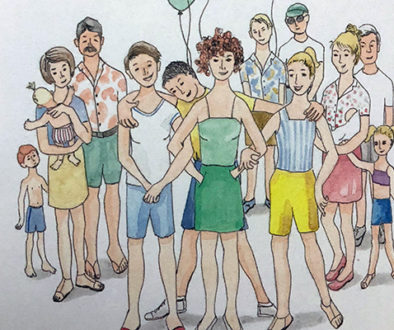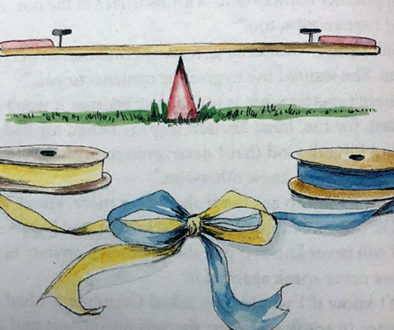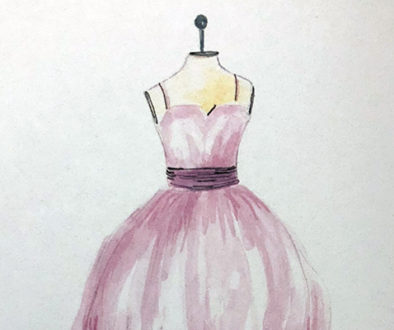Forever and a Day: Chapter 8
“Truths and roses have thorns about them.”
– Henry David Thoreau
I had the day to myself after dropping my parents off at Pier 91 to board the Alaskan cruise ship. My mother had been unusually quiet during the morning preparations to leave, and I jabbered non-stop to fill the void. Grandma had recovered and was doing well enough to leave the rehab center. Just three days ago, a family group of us had moved her into her room at the new home. It was a good-sized room with a big picture window overlooking the well-tended gardens; it was large enough for Grandma’s small recliner situated close to the television, always on, and a metal folding chair. My mother had hung Grandma’s favorite seascape painting on the blank wall next to her bed, done by an artist she had met years ago; brought her the blue and yellow patchwork quilt she had made for her, and Uncle Ryan peopled the dresser with photos of family, mostly him with his boys. Grandma reveled in the attention, just like she had always done when Mom, Uncle Ryan, his two sons and myself, spouses, had surrounded her while she held court. The heartbreak for all us, especially my mother, was when Grandma announced it was time to go home—-whose car would she be riding in? Five of us quietly bled out of the room, leaving Mom and Uncle Ryan with Grandma. Uncle Ryan, in his brusk way, had tried to make her understand she was home, which had upset Grandma so much she had latched onto my mother’s hand and pleaded to go home with her. After what seemed hours, probably in reality fifteen minutes, Mom and Uncle Ryan joined our motley crew in the lobby. After all the histrionics, Grandma had drifted, come back and talked about how she had always liked living here in the condo with such lovely landscaped grounds.
I was restless, and after re-reading yet another page of Magic for Beginners, I turned off the Kindle. The one thing I could do for my mother was pack up Grandma’s belongings in the empty boxes in her room. I’d call my Grandma a neatnik, so well organized was her room, unlike mine. She had a journal with a fat, black pen on the nightstand next to her bed. I hesitated before I sat on the bed and opened it. Pasted inside the front of the journal was a typed poem, “One Perfect Rose”:
A single flow’r he sent me, since we met.
All tenderly his messenger he chose;
Deep-hearted, pure, with scented dew still wet–
One perfect rose.
I knew the language of the floweret;
“My fragile leaves,” it said, “his heart enclose.”
Love long has taken for his amulet
One perfect rose.
Why is it no one ever sent me yet
One perfect limousine, do you suppose?
Ah no, it’s always just my luck to get
One perfect rose.
I laughed out loud, feeling at that moment a thousand connections to my Grandma, for I had read that same passage and highlighted the page in my book of collected poems of Dorothy Parker. I flipped through the pages, a twinge of guilt for snooping pinching me, but went ahead and read a few of her most recent entries.
All these voices whispers of ourselves that should be heard
memories are puzzle pieces, capturing moments in our lives to piece together as a puzzle
my mind, so clear some days like an endless blue sky. then my thoughts, like wispy clouds, almost real memories floating I can’t quite capture some days it rains from dark clouds I am overwhelmed by sadness of what I cannot remember.
I put the journal down, my hand resting on the cover feeling the waves of melancholy wash over every part of me, imagining Grandma in a lucid moment writing this. I will take this with me when I go see her this afternoon, give it to her. Then I remember the photo album and after looking in desk drawers, dresser drawers, underneath the bed, I find it in the closet on top of a locked metal document box. The box is about the size of a shoebox. Whatever object is in there makes a muffled noise when I shake the box.
Once again, I sit on the bare mattress to browse through the photographs, many of them of people and places unfamiliar to me. I recognize my mother in old black and white pictures that captured her maturing from a toddler to a young woman in a new Easter outfit. I really like the baby pictures of her, especially a series of her running alongside a Golden retriever naked with a discarded diaper behind her.
Of course, I am more interested in the picture Grandma showed me of the man named George. I pry behind each photo carefully with my fingernail until I find it. There is another one I find, one where my Grandma is in a satiny formal dinner dress, beside George; and another one, with George, and some other man. Upon looking closer I think it might be my Grandfather, Karl, as a young man, and the picture Grandma had shown me of her as a young woman on a picnic with George. It occurred to me that someone else was there taking the picture.
And there is something else about the photograph of George that alerts me, but it is elusive. I look again, very closely. Something about his smile. I flip back to the pictures of my mother in her Easter outfits and there is one of her smiling directly at the camera, a very similar pose to the one of George in his tuxedo.
I put the photos all back as I had found them, then with the journal and photo album together, leave the room to get ready to go see Grandma.
She is awake, sitting up in bed sipping a cup of tea. “Fran! My goodness, if I known you were coming I still wouldn’t have baked a cake.” She put aside her cup. “Seems I can’t do much of anything lately.”
“Hi, Gram,” I kiss her forehead with a loud smack. “How are you?” It’s an auspicious sign that she knows who I am.
“I have been better, thank you anyway.” She points to the walker. “I hate that damn thing. I’d rather use my cane, but I can’t find it.”
This isn’t going easy with Grandma in one of her dark moods. “I’m thinking that when your hip is totally healed, you’ll be able to use your cane again. And by the way, Gram, I brought you something.” I put the journal down beside her with the pen clipped to the front cover. “I thought maybe you would like to write in it.”
She stares at it for long moment before she sighs, takes the pen and lays it in her lap. She turns her hands over, tracing age spots with a finger on her left hand. “Look at my age spots. Maybe if I connected them with a magic marker, my whole life would come together as a puzzle does.”
“Well, how about this? I also brought your photo album.” I scoot my chair close her bedside. “I’d like to ask you some questions about the pictures you showed me.”
I watch her intently as she thumbs through the album. She pauses. “This is your other Grandmother. You called her Mimi. There’s a story behind that.”
“Actually that’s great-grandmother, but…”
“You were just four and eavesdropping when I was pointing out to your father that all that woman does is talk about ‘me, me,me’; after that you wouldn’t call her anything but Mimi. And she thought you were so clever to have a special name for her!”
“I haven’t heard that story before. Um, Grandma, who’s taking the picture here, where you and George are sitting on a blanket?”
She smiles at me, kind of a goofy look that I know means she is drifting away. I am desperate to hold onto the thread of truth that connects to her memory. “Grandma! Can you tell me who this is and who is taking the picture?”
She flicks her hand weakly, dismissing me. “I am an old woman now. I forget things.” She closes her eyes and I know I’ve lost her. As I start to get up she says to someone, or no one, “Then it all comes back to me and it is too much. I am tired, tired to my bones.”
I leave the photo album within reach, take the pen and clip it back onto the cover of the journal before I leave.
And it goes pretty much the same day after day. Some days she is happy to be there, some days she implores me to take her home. I brought her a bouquet of roses from her George Best rose bush and she burst into tears.
“Grandma! I didn’t mean to make you cry!” I swipe at her tears. She grabs my hands and brings them to her lips to kiss.
“It’s okay, pet. You’ve made me so happy.”
She certainly didn’t look happy.
“Fran,” she pulls me closer and I dread that she might beg me to take her home with me. Why didn’t I think this thing through? Of course roses from her beloved bush would trigger an emotional outburst. “Fran,” she whispers, though there is no need, “if you won’t take me home with you, do me a favor, please?”
I pull back a bit, my hands still lassoed by hers. “If I can I will.”
“Beneath the rose bush I buried a half-pint Mason jar. It has a key in it that will unlock the metal box on the upper shelf of my closet at your house. Bring those to me. Tomorrow.”
“Grandma, all this time you were trying to unbury something?” Well, another upending of an assumption.
“Yes, yes, I’m older and just a bit wiser.“ She shakes our hands and lets go of mine. “I realize that I cannot bury my past.” She examines her hands for several minutes. “These brown age spots on my hands…when I was young, they were freckles.” She draws her finger along, connecting them with an imaginary line. “These are the stories of my life.”
“I’ll go right home and find that key. Grandma, I love you.” I kiss her as she closes her eyes and decamps.
I spent three hours digging a five foot moat with a spade around the rose bush without finding anything but rocks. I threw the spade down, near tears. Maybe the jar fell down a rabbit hole and landed in Beijing. It took an hour to fill the trough back in with dirt, and by that time all I wanted was a cold drink and a shower.
Exasperated with everything, even the steady plopping of droplets from my wet hair, I sat staring at Puget Sound. What was I going to tell Grandma? I’ve never broken a promise made to her.
The mind works in ways a lot like a computer, scrolling through the subconscious for answers in stored memory. Out front is a purple rhododendron. When I get my laptop, I type in the browser what I know it is: Rhododendron Loderi, and up pops pictures of the Rhododendron Loderi King George. If my hunch is right, I’ll find that jar.
It only took me forty minutes to find it with a shovel this time. And the bonus: the bush got some needed TLC.
I got to Grandma’s room earlier than I had any day previously. She was flipping through the photo album too fast to really see anything but a blur I am sure.
“Gram! I found the jar!” I held it up for her to see that the seal had not been broken and the key was still encased in a wad of wrapping paper. “It was beneath the rhodie.”
She studiously ignored me. I sat down in the padded, folding chair and waited for her attention.
“Gram…”
She threw the album at me, but it landed short of hitting me and skidded to my feet. “I don’t like it here. I want to go home!” She impaled me with her stare.
It felt like I was super-glued to the chair; I couldn’t move or speak, but every breath I took sounded in my ears like a steam engine laboring up a mountainside. It might have a minute, it might been an eternity when I realized someone was standing next to me.
The nurse lay her hand on my shoulder. “Your Grandmother is having a bad day.”
“Really.” I nodded.
Grandma hunched over and glared without replying. The nurse approached Grandma but stayed out of harm’s reach. “Mrs. Karlson, Dr. Smith will be in to see you in five minutes. I’m afraid I have to ask your granddaughter to leave.”
Finally able to move, I gathered the scattered pictures up, shoved them into the album, got my wallet and the box, and left.
I was still pretty shaken up when I got home, thrown into a whirlwind of self-recrimination, blaming myself for setting her off with the roses the day before, scared at the monster in her, and mad that it was this way. I had been so curious to know what was in the box, so sure it had something to do with my history, and now all I wanted to do was pitch it in Puget Sound. I did not want to ever go back to the home and see Grandma. That woman was not the person who is my Grandmother. She may have her mean, petty, little ways, but she never, ever, would do bodily harm to me.
The phone rang and I literally jumped out of my chair. My hand was shaky when I answered to hear Dr. Smith introduce himself.
“…and it is typical behavior of Alzheimer patients. Please try not to take it personally. She’ll have no recollection of this incident.” He paused.
Not take it personally? How else do you take an act of aggression? I swept my hair from my forehead, trying to think clearly. “Did I make her mad? I brought her roses from her favorite bush and I think I may have stirred up some bad memories.” No, I meant sad memories.
“Miss Reed, I assure you, you did not make her mad. I repeat, this is typical behavior of the disease in advanced stages. Tomorrow she won’t have remembered any of it.”
“Oh! You think I should come back?” I don’t think I want to do that. “Okay, yes, I’ll come around the same time as the other days. She seemed more like herself. Thank you. Good-bye.”
Advanced stage; I knew what it meant. You can only bury your head in the Kindle for so long before the reality of the situation becomes apparent. But a little voice inside my head reminded me that we are all in advanced stage of life; the minute we are born, we move towards our death. Not that it was all that comforting to know my grandmother was never going to be the person I loved before, but I found solace in having had her throughout my life so far. And I will love her until the day she dies.
What to do with the box? and the key? Because curiosity compels me is a refrain through my head. I think the right thing would be to wait for my mother and discuss it with her when she comes back from her trip. But isn’t it funny how you can make a solid resolution and it turns out to be as substantial as a cloud.
It was Grandma who made the decision for me. I skipped a day before going back to see her and I came no earlier, no later than I had on her ‘good’ days.
She perked up with a radiant smile. “Hello, my favorite granddaughter!”
I’m her only granddaughter, but today this is the best salutation I’ve ever heard and I feel a tingle of happiness throughout my whole body.
“Hugs and kisses!”
I only hesitate for a split second, but I am still ashamed that it was my first impulse. She traced her finger along my cheek. “I’ve been thinking.”
No irony in that.
“I want you to open that metal box. There is something I want you to have. You will find some papers. You must share those with your mother. And a ring. I want you to have the ring.”
“Grandma, I could bring the box here and you could open it.”
“No, Fran, please don’t. You’ll understand it all better after you open the box. I used to think of it as my own Pandora’s box.”
“Geez! Maybe I don’t want to let out all those ills upon us!”
“Ah, but,” she tapped the air with her finger, “hope was left behind. And I hope empathy.”
“Oh, Gram, you’ve never done anything to be forgiven for.”
“And young lady, how would you know? You’re not your mother.”
I ease away, backing off to the folding chair far enough from her that she can’t reach me and keep a lightness in the tone of my voice. “I am my mother’s daughter, and your granddaughter, that’s how I can be certain of what I say.”
She grunts. “You’re young yet. You’ll learn. You’ve got heartache in your future, that much I know.”
I blow her a kiss from the doorway. “I know, Grandma, I know.”



